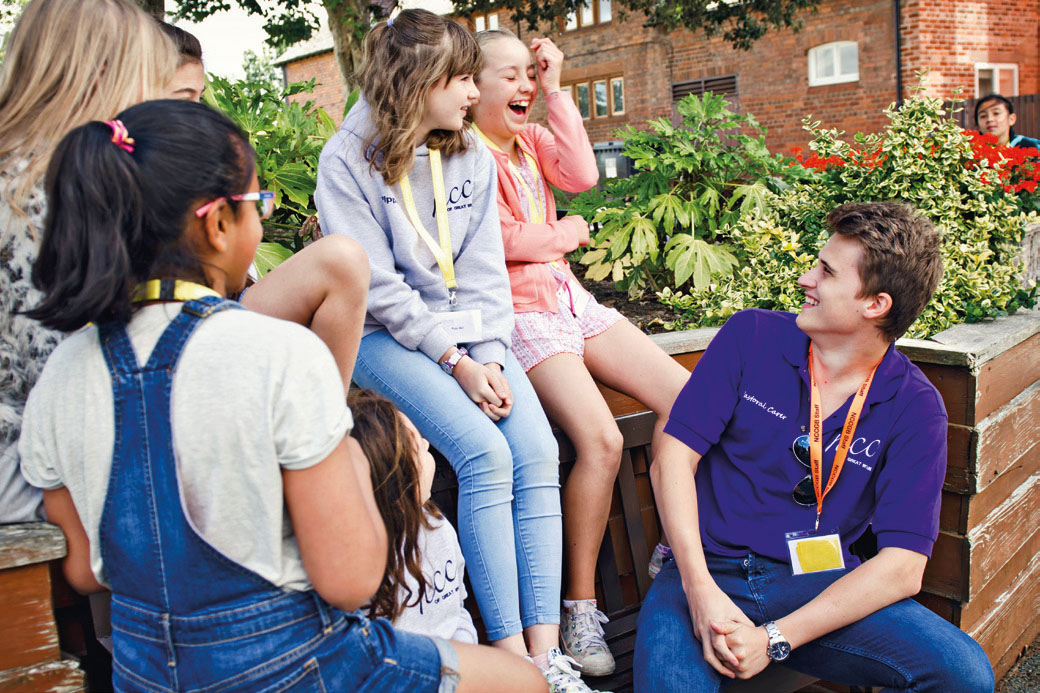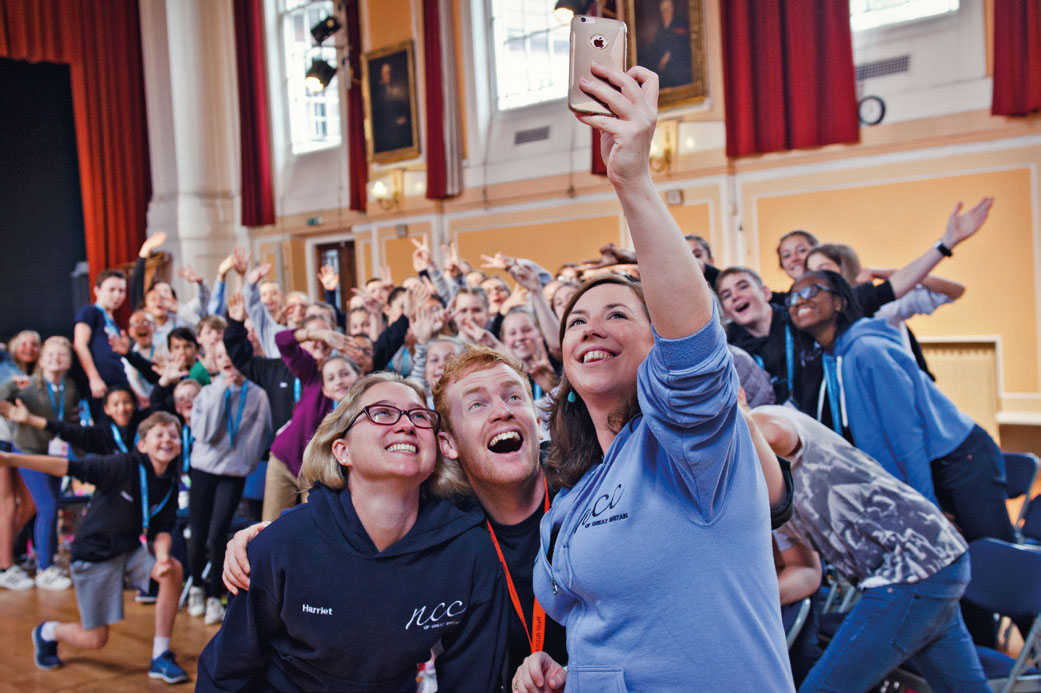
‘The most effervescent place’: this is how the National Children's Choir of Great Britain's newly appointed musical director, Dan Ludford-Thomas, describes the atmosphere on an NCCGB course. ‘The courses are absolutely infused with enthusiasm,’ he says – and that will be crucial to maintaining the organisation's special ethos. Luckily, Ludford-Thomas has enthusiasm in spades.
Ludford-Thomas has been appointed following the departure of founder-director Lissa Gray in 2017, initially on an interim basis but now, after a recruitment process begun in autumn 2017, as a permanent appointment. He speaks to MT at Dulwich College in South London, where he is head of vocal studies.
The organisation was looking for somebody with ‘strong, empathetic understanding of the music, and the ability to engage with a children's choir,’ says general manager Kim Reffell, who has worked with the choir since joining as a pastoral carer in 2005. ‘I've observed many conductors over the years, and how they bring the sound from the children but don't force it – it has to be a joy. The music has to be a joy for that child or young person.
‘The candidates were all so good, they all had amazing skills, but Dan was the best candidate and was appointed by the trustees.’
Selling points
NCCGB is structured progressively in four choirs: Yellow, for children in Year 6; Blue, for Years 7-10; Green, for Years 8-10; and the Senior Choir, for girls in Year 10 and above and boys with changed voices. There are up to 300 members overall, meeting twice a year at residential courses in the Easter and summer holidays. Each child receives two singing lessons on each course, and the ratio of participants to staff is roughly five to one.

Students relaxing on the Summer 2017 course

Ludford-Thomas: ‘A brilliantly fun environment’
‘Anyone who visits is genuinely amazed by the positive attitude of the staff and the kids,’ says Ludford-Thomas. ‘It is a brilliantly fun environment, but they work hard during the day. The kids are the biggest selling point – we get them in, and then it's just joy, because they can do stuff. It's auditioned, and therefore they're coming in with a certain level of skill, so even the yellow choir [made up of children in Year 6] can sing two- and three-part repertoire.
‘Of course, as children move through the choirs the challenge becomes keeping the older ones going while they go into changing voice territory, making sure that the tenors and basses keep up – so you have to be quite clever about the arrangements, to make it vocally easier and less stressful for them. That means a lot of piano support, while letting the sopranos flow and keep developing. But that's managing it, the differentiation between the choirs.’
Both Reffell and Ludford-Thomas agree that it is crucial to maintain the choir's ethos. Reffell's plan for the organisation is, she says, ‘To be what we are, not to change what we are. What we are is very special to us.’ And for Ludford-Thomas, ‘The strategy is to make sure that we maintain the strong core of singers that we have, and to do that it has to remain fun.’
Programming is central to that aim. ‘We have to keep putting forward projects that are interesting,’ says Ludford-Thomas. ‘For example, we have a recording programme going on – we did Ceremony of Carols last time round – with a top-level producer in Jon Cohen, which lifts the standards from it being a home-grown thing to a very professional recording. Our touring programme is every other year, going to a European venue and then a long-haul trip. We went to Spain in 2016 and we're going to China this summer.
‘And then it's to make sure that the staff and the children are realising their ambitions and enjoying what they are doing. The other thing perhaps is to make sure that we're not afraid to be outward-facing, sometimes. We do have visitors come to see us, but we will always look for opportunities to put ourselves into the public spotlight, perhaps at the end of courses, when we've got something polished and done.’
Unified philosophy
Ludford-Thomas is now officially tasked with leading the artistic and technical development of NCCGB, its members and teaching staff. He is a trained primary teacher with a strong choral background (he conducts several choirs around London and the South East and has worked on Eton Choral Courses and behind the scenes on several of Gareth Malone's BBC series, as well as being a former Choirboy of the Year) who says that his biggest strength is ‘getting grumpy teenagers singing’.
What will his approach be to the job? ‘I think it's important that we have a unified philosophy of how the kids are singing, from the time that they come to us all the way through, so that you're building, and aren't having to do big fixes. The challenge on that is people coming in at different entry points – but if there's a strong philosophy of how we sing, and that all the conductors and all the singing teachers are linked up to what is a sensible, simple strategies and expectations.
‘We also need to be happily sitting next to our competitors, just saying: “we're good, so are you”. If we're doing good things we're not going to be concerned about sitting alongside other institutions.
‘We need to make sure that we keep these kids with us. We're not looking for world domination, we're just looking to be the national institution that we are.
‘It's a children's choir, in which children are able to excel. And of course that's a challenge for me, and I've got to make sure that the children's choir element is really good. That'll be based on the staff that we use and the opportunities that we give that staff.
‘We must remember that we're a support act to what's going on in the rest of our members’ lives. Many schools and counties run excellent choirs, and so we benefit from those guys coming in. Equally, for those who don't have that, we are going to be the best thing that they do in that year.
‘We're always conscious that those who aren't as experienced don't feel trampled on or are talked down to – especially the singing teachers. You've got to make sure that the singing teachers are complementing the children's singing at home – flagging up issues where appropriate, yes, but being respectful.’
Holistic approach
For Reffell, NCCGB's ‘holistic approach’ is hugely important. ‘We're very concerned with the wellbeing of the whole child.’ The team of pastoral staff – many of whom are ex-members – are the ones who make this ethos a reality, she says: ‘It's the people. The art of it is to look as though you're having a wonderful time, while having been up in the night because a child wasn't well, and to still get up in the morning and to smile, and give energy. We have pastoral staff in each rehearsal, a house coordinator in each boarding house, a choir coordinator with each choir, and then a team behind them. They sit in rehearsals, not only to look after the children if one of them needs help – but also they're sitting at the front, they're engaged, and they're encouraging. Their faces are saying: “This is amazing, look what you're doing!” They are deserving of a great deal of respect.’
‘The same applies to the music staff – they are all obviously highly professional, they have an enthusiasm for imparting their excellence to the singers, and all of them are so engaged with the process. They're engaged with developing people's ability, helping them to grow musically and personally – which is what we're all doing. We're all one entity. We are a whole team.’
Into the future
Twenty years into its life and NCCGB has ‘done its growing’, says Reffell. The focus for the new leadership team will be to secure the organisation's artistic development, and its financial and administrative future. This will include developing the backroom team – Reffell is currently the only full-time staff member – in order to allow more time to be spent on fundraising.
‘We would like to extend our bursary provision, because the more bursaries we can provide, the better. This year we're supporting 17 choir members to a greater or lesser extent. But it still has to be a factor that sometimes people don't come because they can't afford it.
‘It's also about remaining relevant, so that the music education is properly a part of the time and place. And it's to give the choir members more experiences.
‘We want to develop the choir, and as the choir increases the range of its activities the backroom staff will need to do more. So it is to develop our excellence, develop our activities. Development involves change, but Dan and I are absolutely solid that we don't want to change the ethos.’
National profile
A higher profile for the organisation is also on the agenda, as Reffell says: ‘There is a profile to be raised. There is no doubt about that. We are very well known in some circles but not as well as we'd like.’ Aspirations include more broadcasting, on programmes such as Songs of Praise and Radio 3's Choral Evensong, and running more small-scale, voluntary events with smaller groups of choir members, with the aim of raising awareness and funds.
There will also be more reaching out to schools, says Reffell – a process that is cumulative, and takes time, but to which there is an imperative for national institutions such as NCCGB to be committed.
‘Neither of us is about saying: “change all that”. It's about evolving, and building excellence upon excellence. The pursuit of excellence is always important, while considering the whole child.’








